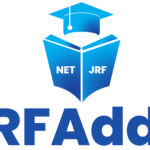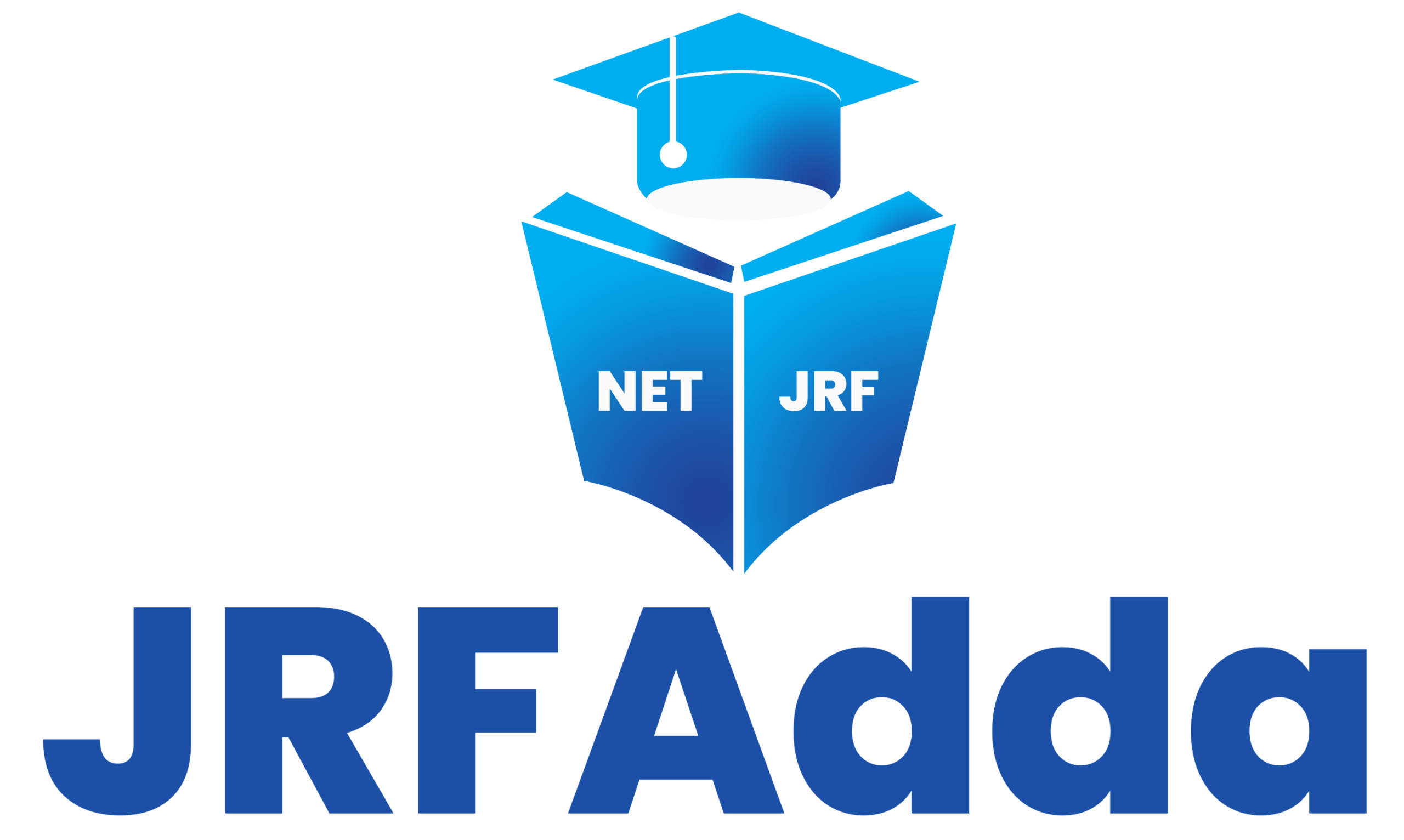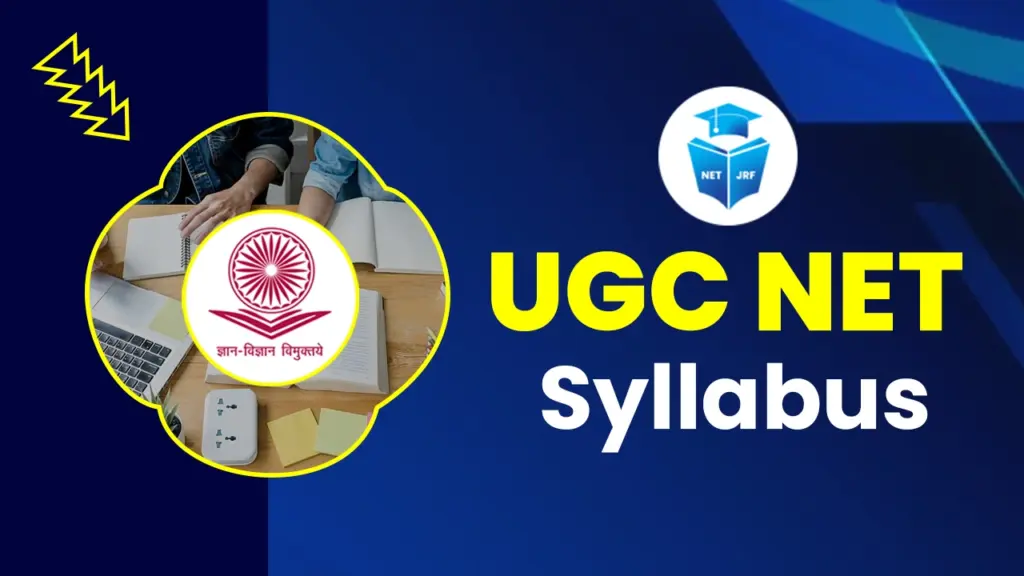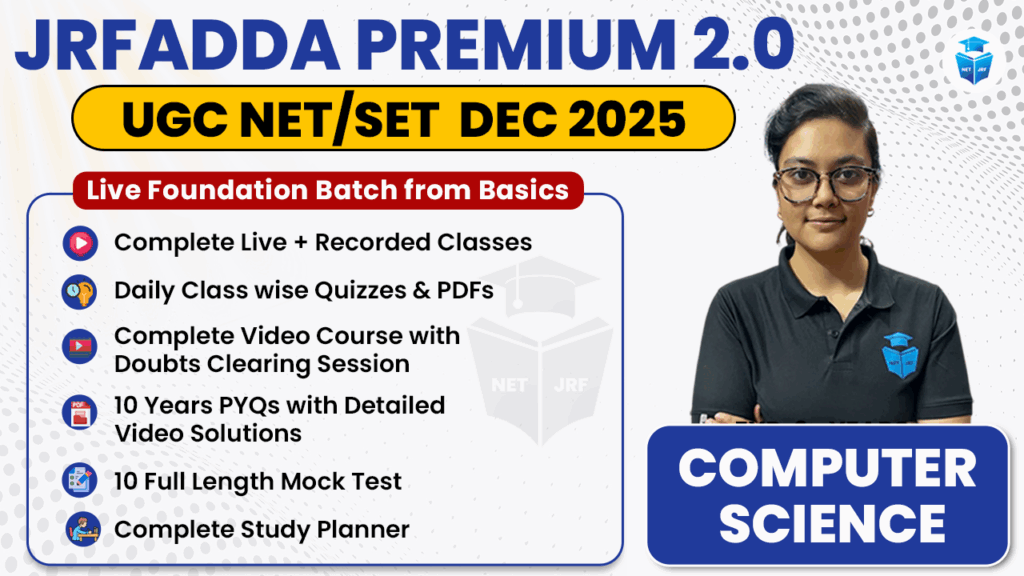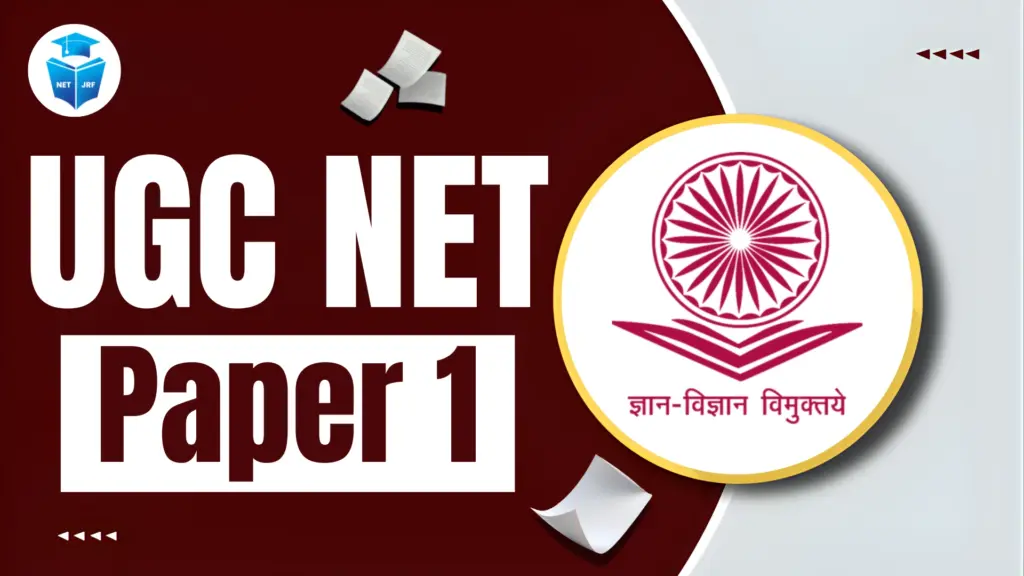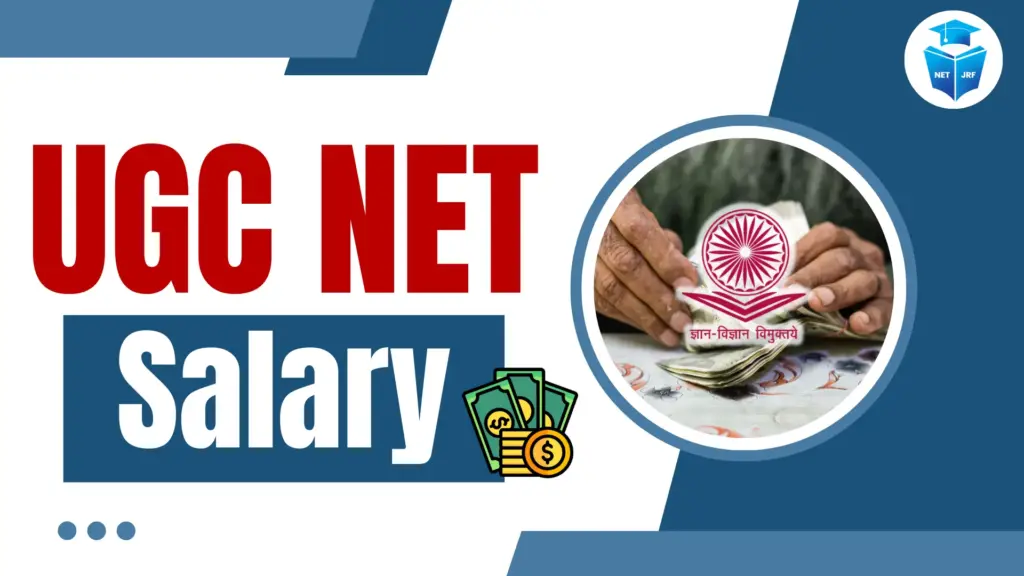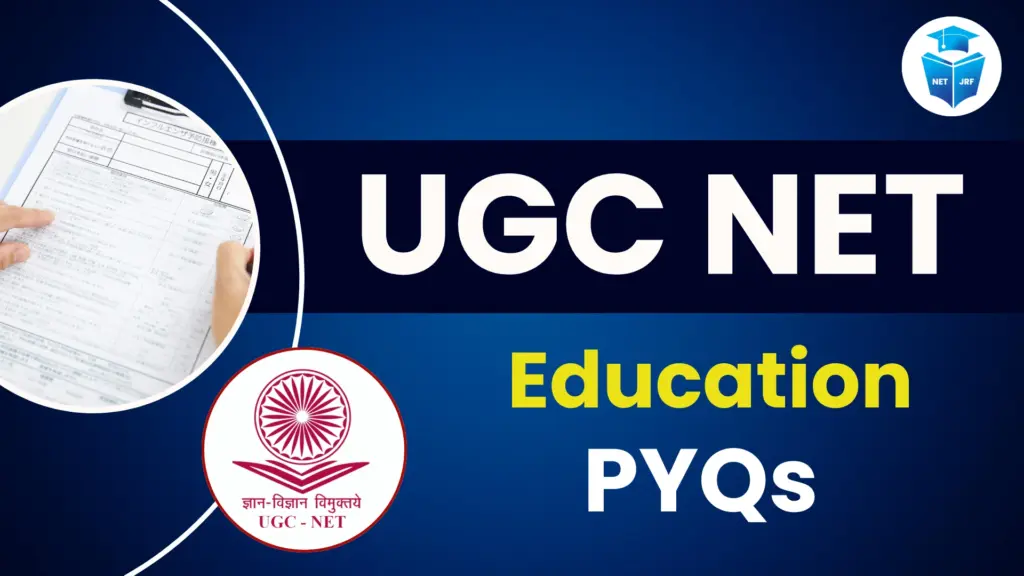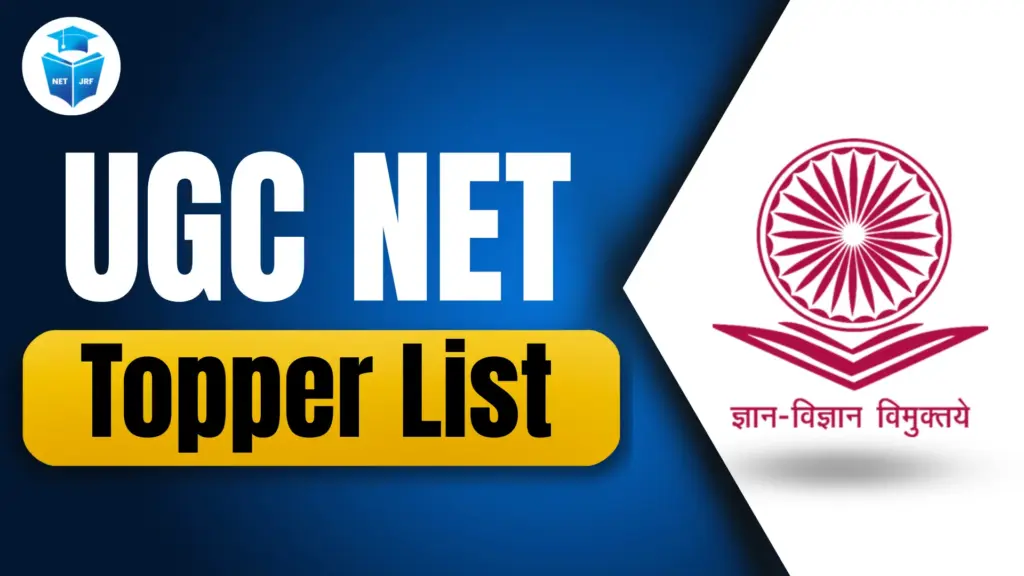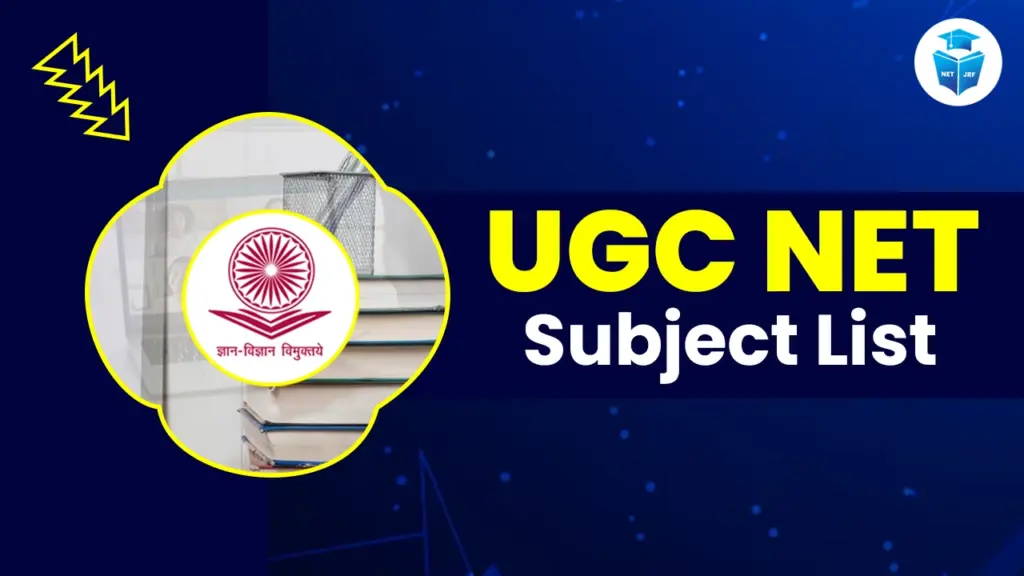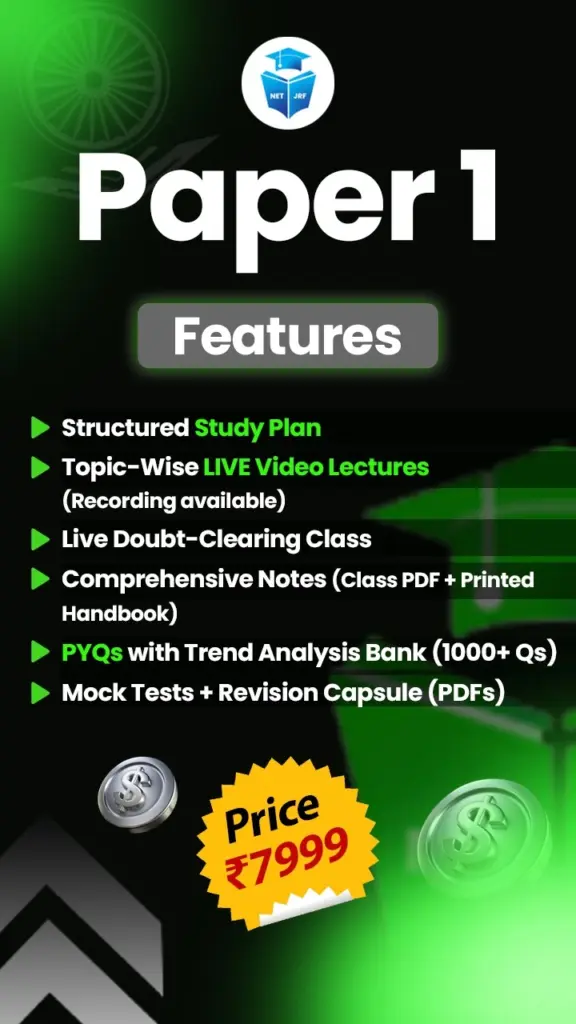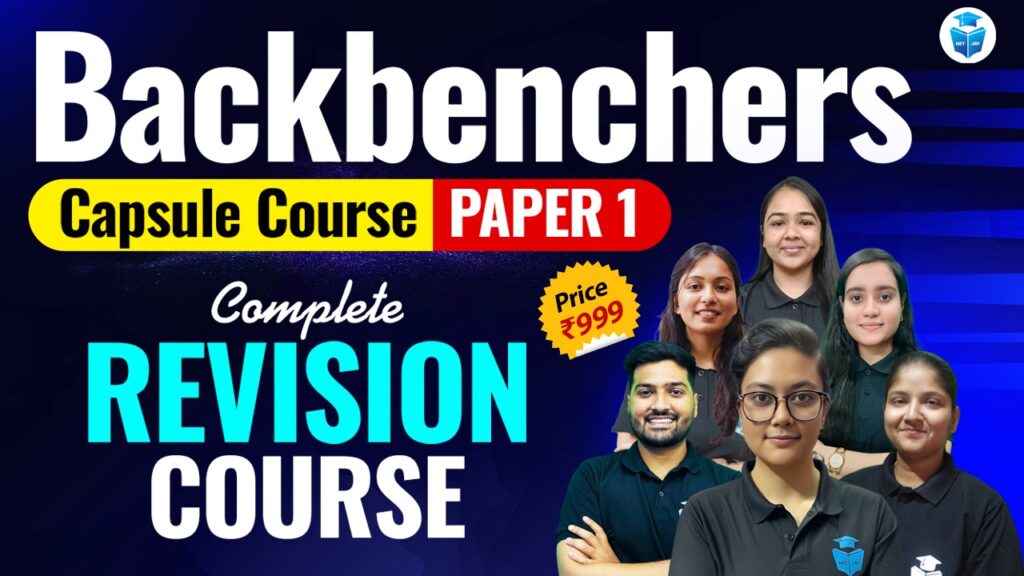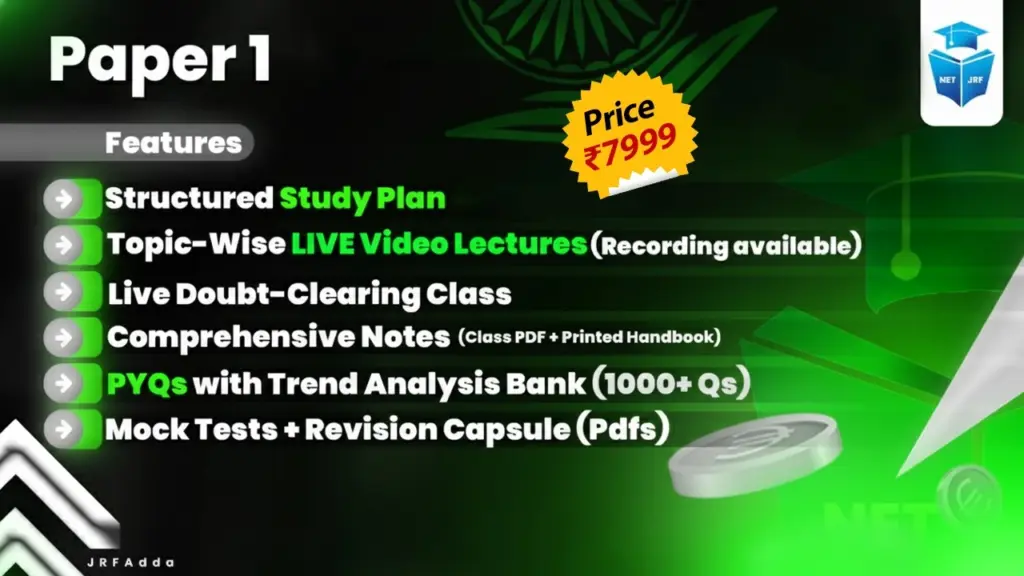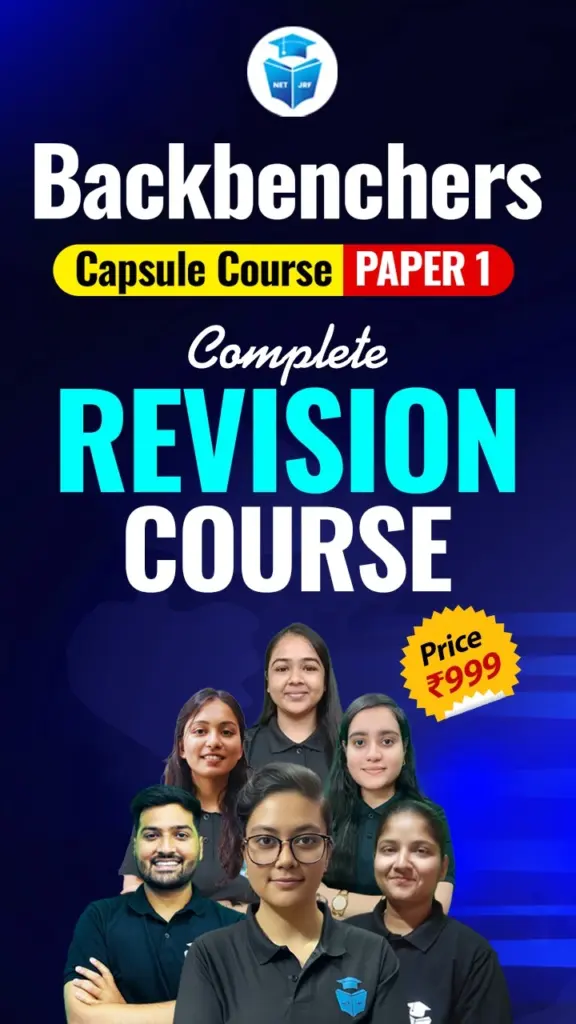UGC NET Syllabus 2026 serves as the primary roadmap for candidates preparing for the upcoming UGC NET June 2026 exam, organised by the National Testing Agency (NTA). This national-level test assesses aspirants for eligibility in Assistant Professorship and Junior Research Fellowship (JRF) across Indian universities and colleges. With the new UGC NET June 2026 session approaching, understanding the detailed UGC NET Syllabus 2026 is essential for structured and effective preparation.
By getting a clear understanding of the UGC NET Syllabus 2026 June, the aspirants can identify priority topics, allocate study time strategically, and strengthen their chances of success. The UGC NET Syllabus 2026 PDF download free link is also available for both English and Hindi, making it accessible for a wide pool of candidates.
Also Read: UGC NET Answer Key Challenge 2026
JRFAdda Premium June 2026 UGC NET Paper-1 Batch- Join Now!
UGC NET Result 2026 OUT!
The UGC NET Result 2026 for the December session has been officially released by the National Testing Agency (NTA) on the 4th of February 2026. The aspirants can now download the UGC NET Result 2026 PDF and check their results.
Check Your UGC NET Result Now and Download Scorecard
Also Read: UGC NET Result 2026
UGC NET Final Answer Key 2026 Released!
The UGC NET Final Answer Key 2026 has been released by the National Testing Agency (NTA) for the December 2025 session. The UGC NET Final Answer Key 2026 release date is 4 February 2026. Once released, the aspirants can download the UGC NET Final Answer Key 2026 PDF.
UGC NET Final Answer Key 2026 Subject-Wise PDF Download—Download Here
Also Read: UGC NET Final Answer Key 2026
UGC NET Provisional Answer Key 2026 Released
UGC NET Provisional Answer Key 2026 has been released by the National Testing Agency (NTA) on 14 February 2026. Candidates were able to download their UGC NET provisional answer key 2026 to check their responses. The objection window to raise any objection and challenge a particular question has now closed on 17 January 2026.
Direct Link to Download the UGC NET Provisional Answer Key 2026 PDF
Also Check : UGC NET Provisional Answer Key 2026 Released
UGC NET Syllabus 2026 June Overview
UGC NET Syllabus 2026 June is divided into two papers, and both papers are held in Computer-Based Test (CBT) mode. To score well in the UGC NET June 2026 exam, candidates must thoroughly understand and prepare according to the latest UGC NET Syllabus 2026.
The two components of the NTA UGC NET June 2026 Syllabus are:
- Paper 1: General Paper on Teaching and Research Aptitude (mandatory for all candidates)
- Paper 2: Subject-specific paper chosen from 85 available disciplines.
Also Read: UGC NET Political Science Syllabus 2026
| UGC NET Syllabus 2026 Overview | |
| Exam Name | UGC NET 2026 (June Session) |
| Conducting Body | National Testing Agency (NTA) |
| Exam Mode | Computer-Based Test (CBT) |
| Papers | Paper 1 (General) + Paper 2 (Subject-Specific) |
| Total Questions | 150 (Paper 1: 50, Paper 2: 100) |
| Total Marks | 300 (Paper 1: 100, Paper 2: 200) |
| Marking Scheme | +2 marks for each correct answer, No negative marking |
| Exam Duration | 3 Hours (No Break) |
| Medium of Exam | English & Hindi |
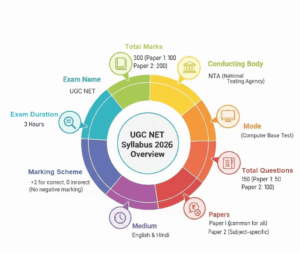
Also Read: UGC NET Application Form 2026
UGC NET Exam Date 2026 June Schedule
As the UGC NET June 2026 session is now fast approaching it is important that the Candidates must go through the detailed UGC NET Syllabus 2026 to be thoroughly prepared for the examination. The detailed UGC NET 2026 exam date subject wise schedule will be officially released by NTA once the registration has finished for the June 2026 session. The candidates will be able to download the UGC NET 2026 Exam Date subject wise PDF schedule from the article link provided below once officially released. Stay in touch with the NTA Official website to be updated for the UGC NET Exam Date 2026 and the UGC NET Admit Card 2026.
Also Read: UGC NET Exam Date 2026
UGC NET Syllabus Paper 1 PDF Download 2026 in Hindi and English
The UGC NET Syllabus Paper 1 PDF download 2026 is common to all candidates, irrespective of their chosen subject for Paper 2. Having a clear understanding of the NTA UGC NET Syllabus 2026 June enables candidates to prepare with a well-planned and focused strategy. Candidates can now access the UGC NET Syllabus Paper 1 PDF download 2026 in both Hindi and English for free using the links provided below or from the official website. This option allows aspirants to instantly review the complete syllabus and enhance their preparation. Additionally, those preparing for Law can refer to the UGC NET Law Syllabus Paper 1 PDF to ensure every topic required for both Paper 1 and Paper 2 is effectively covered.
| UGC NET 2026 Paper 1 Syllabus PDF | PDF Link |
| UGC NET Paper 1 Syllabus English | Download PDF |
| यूजीसी नेट फर्स्ट पेपर सिलेबस इन हिंदी PDF / UGC NET Paper 1 Syllabus in Hindi pdf download | डाउनलोड PDF |
Also Read: UGC NET Computer Science Syllabus 2026
UGC NET Paper 1 Syllabus 2026 (Topics)
UGC NET Paper 1 is a compulsory paper designed to assess the general aptitude required for teaching and research positions. The UGC NET Exam Syllabus 2026 for Paper 1 is divided into ten comprehensive units that cover a range of general topics. These units are designed to assess key abilities, including analytical thinking, comprehension, communication skills, logical reasoning, and general awareness relevant to the higher education system. The UGC NET Paper 1 syllabus 2026 is as follows:
| Unit Name | Key Subtopics |
| Teaching Aptitude | – Concept, objectives, levels of teaching, Characteristics and basic requirements
– Factors affecting teaching, Off-line vs On-line methods (Swayam, Swayam Prabha, MOOCs) – Teaching Support Systems: Traditional, Modern, ICT-based |
| Research Aptitude | – Research: Meaning, Types, Characteristics, Methods: Experimental, Descriptive, Historical, Qualitative, Quantitative
– Steps of Research, Thesis and Article writing, Format and styles of referencing, Application of ICT in research, Research ethics |
| Comprehension | – Text passage provided, Questions based on the passage
– Understanding and interpretation skills |
| Communication | – Meaning, types, and characteristics
– Verbal and Non-verbal communication, Inter-Cultural communication, Group communications, Classroom communication, Barriers to effective communication – Mass-Media and Society |
| Mathematical Reasoning and Aptitude | – Types of reasoning, Number series, Letter series
– Codes and Relationships, Fractions, Time & Distance – Ratio, Proportion, Percentage, Profit and Loss, Interest and Discounting, Averages |
| Logical Reasoning | – Structure of arguments and argument forms, Uses of language
– Deductive and inductive reasoning, Analogies, Venn diagrams -Indian Logic: Means of knowledge, Pramanas: Pratyaksha, Upamana, Shabda, Arthapatti, Anupalabddhi |
| Data Interpretation | – Sources, acquisition, and classification of Data, Quantitative and Qualitative Data
– Graphical representations: Bar-chart, Histograms, Pie-chart, Table-chart, Line-chart, Data mapping – Data Interpretation, Data and Governance |
| Information and Communication Technology (ICT) | – General abbreviations and terminology, Internet basics
– E-mail, Audio and Video-conferencing – Digital initiatives in higher education, ICT and Governance |
| People, Development and Environment | – Sustainable Development Goals, Human-environment interaction, Environmental issues, Climate change and socio-economic-political dimensions, Natural and energy resources
– Environmental Protection Act (1986), International agreements: Montreal Protocol, Rio Summit, Convention on Biodiversity, Kyoto Protocol, Paris Agreement, International Solar Alliance |
| Higher Education System | – Institutions of higher learning in ancient India, Evolution of higher learning post-Independence
– Technical education, Skill-based education, Value education, Environmental education – Policies, Governance, and Administration |
Also Read: UGC NET Paper 1 Preparation Tips 2026
UGC NET Syllabus 2026 Paper 2 PDF Download (Subject-Wise)
Paper 2 of the UGC NET June 2026 exam is subject-specific and designed to test a candidate’s in-depth understanding of their chosen discipline. The UGC NET June 2026 syllabus of Paper 2 is designed to ensure a comprehensive evaluation of a candidate’s subject expertise. To perform well in this section, aspirants must carefully go through the updated UGC NET Syllabus 2026 Paper 2 for the upcoming June cycle, prioritise high-weightage topics, and identify patterns from previous year questions (PYQs). Candidates preparing for specific subjects such as the UGC NET Syllabus for Computer Science and the UGC NET Syllabus Physical Education 2026 should focus on understanding the latest topic-wise updates and align their preparation strategy accordingly.
JRFAdda Premium June 2026 Law Batch Paper-2- Join Now!
UGC NET Syllabus Paper 2 PDF Download 2026 (in English)
Unlike Paper 1, which is common for all, Paper 2 gives candidates the option to choose from over 85 subjects, including History, Sociology, Political Science, Psychology, and many more. To get more information about the UGC NET Syllabus 2026 Paper 2 and the UGC NET Paper 2 subjects of each paper, download the UGC NET syllabus Paper 2 PDF from the official website or from the table below. Aspirants preparing for specific subjects such as the UGC NET Syllabus for Computer Science and the UGC NET Syllabus Physical Education 2026 can also check detailed unit-wise topics, recent updates, and important areas for the UGC NET June 2026 exam cycle.
Also Read: UGC NET History Syllabus 2026
Also Read: UGC NET English Syllabus 2026
UGC NET Syllabus 2026 in Hindi
The UGC NET Exam Syllabus 2026 for both Paper 1 and Paper 2 is also available in Hindi, making it easily accessible for Hindi medium candidates preparing for the upcoming UGC NET June 2026 exam. For Hindi-speaking candidates, having the UGC NET Syllabus 2026 in Hindi, their native language, enhances comprehension and retention, especially for conceptual and analytical subjects.
JRFAdda Premium June 2026 Public Administration Batch Paper 2- Join Now!
UGC NET Syllabus 2026 PDF Download in Hindi (Paper 2)
By providing the UGC NET Syllabus 2026 in Hindi for both Paper 1 and Paper 2, the NTA ensures an equal opportunity for Hindi-medium students to understand the official framework, weightage distribution, and key themes for both papers. The UGC NET Syllabus 2026 PDF download in Hindi free links are provided below for Paper 2, allowing aspirants to access the complete UGC NET Syllabus 2026 easily and plan their preparation effectively.
Also Read: UGC NET Law Syllabus 2026
| पेपर कोड | यूजीसी नेट हिंदी सिलेबस पेपर 2 PDF | डाउनलोड लिंक |
| 0 | यूजीसी नेट सामान्य पेपर (पेपर -I) | डाउनलोड PDF |
| 1 | अर्थशास्त्र / ग्रामीण अर्थशास्त्र / सहयोग / जनसांख्यिकी | डाउनलोड PDF |
| 2 | यूजीसी नेट राजनीति विज्ञान सिलेबस | डाउनलोड PDF |
| 3 | यूजीसी नेट दर्शन सिलेबस | डाउनलोड PDF |
| 4 | यूजीसी नेट मनोविज्ञान सिलेबस | डाउनलोड PDF |
| 5 | यूजीसी नेट समाजशास्त्र सिलेबस | डाउनलोड PDF |
| 6 | यूजीसी नेट इतिहास सिलेबस | डाउनलोड PDF |
| 7 | मानव जाति विज्ञान (Anthropology) | डाउनलोड PDF |
| 8 | व्यापार अध्ययन | डाउनलोड PDF |
| 9 | यूजीसी नेट शिक्षा सिलेबस | डाउनलोड PDF |
| 10 | सामाजिक कार्य | डाउनलोड PDF |
| 11 | रक्षा और सामरिक अध्ययन | डाउनलोड PDF |
| 12 | यूजीसी नेट गृह विज्ञान सिलेबस | डाउनलोड PDF |
| 14 | सार्वजनिक प्रशासन | डाउनलोड PDF |
| 15 | जनसंख्या अध्ययन | डाउनलोड PDF |
| 16 | संगीत | डाउनलोड PDF |
| 17 | प्रबंधन (व्यवसाय प्रशासन / विपणन / औद्योगिक संबंध / वित्तीय प्रबंधन) | डाउनलोड PDF |
| 20 | यूजीसी नेट हिंदी साहित्य सिलेबस | डाउनलोड PDF |
| 25 | यूजीसी नेट संस्कृत सिलेबस | डाउनलोड PDF |
| 30 | यूजीसी नेट अंग्रेज़ी सिलेबस | डाउनलोड PDF |
| 31 | यूजीसी नेट भाषा विज्ञान सिलेबस | डाउनलोड PDF |
| 43 | राजस्थानी | डाउनलोड PDF |
| 46 | प्रौढ़ शिक्षा/सतत शिक्षा | डाउनलोड PDF |
| 47 | यूजीसी नेट शारीरिक शिक्षा सिलेबस | डाउनलोड PDF |
| 49 | अरब संस्कृति और इस्लामी अध्ययन | डाउनलोड PDF |
| 50 | भारतीय संस्कृति | डाउनलोड PDF |
| 55 | श्रम कल्याण/मानव संसाधन प्रबंधन | डाउनलोड PDF |
| 58 | यूजीसी नेट कानून सिलेबस | डाउनलोड PDF |
| 59 | पुस्तकालय और सूचना विज्ञान | डाउनलोड PDF |
| 60 | बौद्ध, जैन, गांधीवादी और शांति अध्ययन | डाउनलोड PDF |
| 62 | धर्मों का तुलनात्मक अध्ययन | डाउनलोड PDF |
| 63 | जनसंचार और पत्रकारिता | डाउनलोड PDF |
| 65 | प्रदर्शन कला – नृत्य/नाटक/रंगमंच | डाउनलोड PDF |
| 66 | संग्रहालय विज्ञान और संरक्षण | डाउनलोड PDF |
| 67 | पुरातत्त्व | डाउनलोड PDF |
| 68 | अपराध विज्ञान (Criminology) | डाउनलोड PDF |
| 71 | यूजीसी नेट लोक साहित्य सिलेबस | डाउनलोड PDF |
| 72 | तुलनात्मक साहित्य | डाउनलोड PDF |
| 73 | संस्कृत पारंपरिक विषय (ज्योतिष, व्याकरण, मीमांसा, दर्शन) | डाउनलोड PDF |
| 74 | महिला अध्ययन | डाउनलोड PDF |
| 79 | विजुअल आर्ट (ड्राइंग, पेंटिंग, मूर्तिकला) | डाउनलोड PDF |
| 80 | यूजीसी नेट भूगोल सिलेबस | डाउनलोड PDF |
| 81 | सामाजिक चिकित्सा और सामुदायिक स्वास्थ्य | डाउनलोड PDF |
| 82 | फोरेंसिक विज्ञान | डाउनलोड PDF |
| 87 | कंप्यूटर विज्ञान और अनुप्रयोग | English Only |
| 88 | इलेक्ट्रॉनिक विज्ञान | English Only |
| 89 | यूजीसी नेट पर्यावरण विज्ञान सिलेबस | English Only |
| 90 | अंतर्राष्ट्रीय संबंध और राजनीति | डाउनलोड PDF |
| 91 | प्राकृत | डाउनलोड PDF |
| 92 | मानवाधिकार और कर्तव्य | डाउनलोड PDF |
| 93 | पर्यटन प्रशासन और प्रबंधन | डाउनलोड PDF |
| 100 | यूजीसी नेट योग सिलेबस | डाउनलोड PDF |
| 101 | सिंधी | डाउनलोड PDF |
| 102 | हिंदू अध्ययन | डाउनलोड PDF |
| 103 | भारतीय ज्ञान प्रणाली | डाउनलोड PDF |
| 104 | आपदा प्रबंधन | डाउनलोड PDF |
| 105 | आयुर्वेद जीवविज्ञान | डाउनलोड PDF |
Also Read: UGC NET Education 2026
How to Download UGC NET Syllabus 2026 PDF?
Candidates may download the authentic UGC NET Syllabus PDFs 2026 following the steps mentioned below:
- Visit the official website – ugcnetonline.in
- The latest UGC NET syllabus interface will open with the syllabus PDFs for both Paper 1 and Paper 2, in both English and Hindi.
- Click on the download button and save the UGC NET syllabus of your desired subject.
Also Read: UGC NET Sanskrit Syllabus 2026
UGC NET Syllabus 2026 PDF Download Free
The UGC NET Syllabus 2026 for Paper 1 and Paper 2 in both Hindi and English from the official UGC NET website are provided below. Click on the UGC NET Syllabus 2026 PDF download free link:
| UGC NET Syllabus Paper 1 PDF & UGC NET Syllabus Paper 2 PDF |
Also Read: UGC NET Commerce Syllabus 2026
Conclusion
The UGC NET Syllabus 2026 is your roadmap to success in the UGC NET June 2026 exam. With the official UGC NET Syllabus 2026 PDF available in both English and Hindi, candidates can prepare confidently for Paper 1 and Paper 2. A thorough understanding of the UGC NET Exam Syllabus 2026 for the June cycle helps aspirants prioritise important topics, manage their revision effectively, and maintain focus throughout the preparation. Download the UGC NET 2026 Syllabus PDF, follow a strategic study plan, and keep practising regularly. With the right approach and disciplined use of the updated UGC NET syllabus 2026, cracking the UGC NET June 2026 session is well within your reach.
UGC NET Syllabus 2026 FAQs
Where can I download the UGC NET Syllabus PDF for June 2026?
You can download the official PDF of the UGC NET Syllabus 2026 for both Paper 1 and Paper 2 from the NTA's official website and also from the link provided in this article.
Has the UGC NET syllabus changed for the June 2026 exam?
No, there have been no major changes in the UGC NET Syllabus for the June 2026 session. Candidates are advised to refer to the latest UGC NET Syllabus as released by NTA to ensure accuracy in preparation.
Is the UGC NET 2026 Paper 1 Syllabus PDF in Hindi available?
Yes, the UGC NET Syllabus 2026 PDF for Paper 1 is available in both Hindi and English.
How many subjects UGC NET 2026 Syllabus Paper 2 PDF is available?
The NTA offers over 85 subjects UGC NET syllabus, including Commerce, Management, Education, Political Science, History, Law, and many more.
What is the marking scheme for the UGC NET 2026 exam?
Each correct answer is awarded +2 marks, and there is no negative marking for incorrect responses in the UGC NET 2026 exam.
